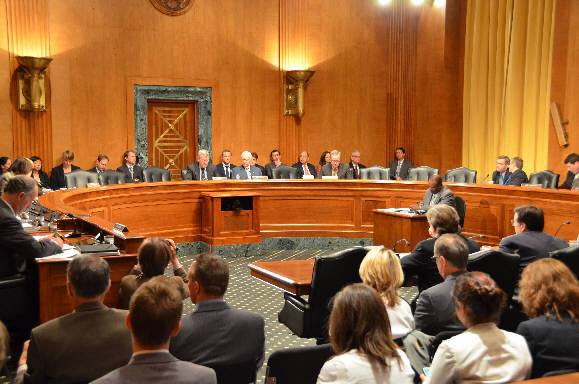Part 4; U.S. Congress aims to give White House free hand to negotiate TPP
Takanori Okabe
“I would like to see a bipartisan trade promotion authority bill introduced by June,” United States Senate Finance Committee Chairman Max Baucus said in his opening statement at a hearing on the Trans-Pacific Partnership pact held on Wednesday, April 23, as the Japanese delegation of anti-TPP policymakers looked on.
In the U.S., Congress basically has the authority over trade policies. TPA, previously known as fast track, gives the President the authority

United States Senate Finance Committee Chairman Max Baucus said, “I would like to see a bipartisan trade promotion authority bill introduced by June,” in Washington, at a hearing on the Trans-Pacific Partnership pact held on Wednesday, April 23.
for a limited period of time to negotiate trade agreements that Congress cannot amend. It expired in July 2007, and without the authority, Congress can ask for amendments in the trade deals already agreed on with other nations, which virtually means the U.S. government currently is not the one to make the final decision in trade negotiations.
The fact that Congress suggested the renewal of TPA, which can be taken as a concession on Congress’ side, signals that it is serious about concluding the TPP talks, a member of the delegation warned.
In the hearing, Orrin Hatch, the ranking Republican of the committee, blamed the slow progress in the TPP negotiations to the absence of TPA. “Unfortunately, after 16 rounds and roughly 37 months of negotiations, it is still not clear whether the agreement will ultimately live up to the lofty expectations,” Hatch said. “I believe one reason for this uncertainty is that our negotiators simply lack the tools necessary to complete the job.” If TPA is granted, the U.S. government is likely to speed up the TPP negotiations to come to an agreement by the end of this year as the member nations are aiming at, and it will become even more difficult for Japan to reflect its interests in the negotiations.
Without TPA, it will also be hard for the U.S. government to put the TPP agreement for congressional approval, as Congress backed by various different interests will start meddling with the agreement.
On the other hand, some in Congress fear that the U.S. government, if it gains authority on trade negotiations, is more likely to make concessions on issues of concern for Congress. To avoid such topsy-turvydom, Congress will surely pressure the government to come up with concrete results in the negotiations including Japan.
Nobuhiko Shuto, former Lower House member and a member of the delegation, expressed concern that the U.S. government, in turn for obtaining TPA, may try to win significant compromises from Japan in the TPP negotiations.
It is still unclear, however, whether Congress will pass the TPA bill, considering the current situation in which the House and Senate are controlled by different parties and that Democrats who keep their Senate majority are traditionally cautious towards trade liberalization.
(May 17, 2013)

